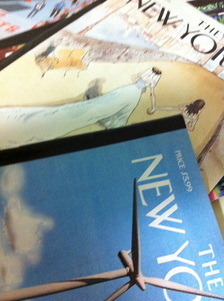
I shared with my Tuesday Morning Women’s Group that while in Seattle I went to a goal-setting meeting. The women at the meeting were friends of my host, Susan, had met twice a month to explore their goals and ask each other to help them be accountable. I came back to the Bay Area curious if we who had been meeting two plus years might also like to set goals together.
I was surprised that the word “goals” churned up anxiety and resistance. Mentioned were childhood summers that started with a “to-do list” from Mom and Dad with expectations that all chores should be completed before the start of school. Also the idea of goals brought up the specter of failure.
I was energized by our goal-setting discussion, despite the resistance that surfaced. By the following Tuesday the group’s aversion had softened. One woman was already an ardent proponent of goals, and she had been absent from the meeting when the topic first came up. Indeed, in the past year she had been an inspiration to us as she undertook home improvement while maintaining a good relationship with her husband who was not a jumping-into-projects kind of man. They replaced their windows, updated the entryway with a sturdy and attractive wrought-iron gate, painted the living room without dispute about color and applied decorative tiles to the fireplace.
So when the topic of goals came up again, we were ready to agree that any of us could set a goal that we thought could be accomplished and it needn’t be about lists of chores like the ones from Mom and Dad. And we wouldn’t write down each other’s goals.
Regardless of what our group wanted to do, talking goals as well as attending a session in Seattle inspired me to be more conscious about goal setting. I would start by finishing my blog “Good Writing Is…” as I had missed my Monday deadline due to fuzzy thinking. When a friend proposed to sort through tee shirts and discard those least worn, I thought I might do that too once I got the blog online. I sensed my goal-setting attitude was more serious than in the past when I chose to pursue activities so as to avoid sloth or to keep from sinking too deeply into the more somnambulant pleasure of movies and TV.
And as sometimes happens when a topic starts to interest me, I wanted to know what others had thought and said. I found the website “Mind Tools” where I learned that people have known for a long time about a goal-setting theory based on Dr. Edwin Locke’s research on motivation and getting things done.
In a 1968 article “Toward a Theory of Task Motivation and Incentives,” Locke talked about how working toward a stated goal really helped motivate people to reach their goals – which, in turn, improved their performance. Although most of the theory was centered on job performance, I could see how even in retirement goal setting might be inspiring. The goals he proposed were SMART goals: that is Specific, Measurable, Attainable, Relevant and Time-bound.
Setting SMART goals could still matter even though I am not in a work environment and don’t have a boss to please. I realize that my achieving self still sees “success” as a goal although I am not sure what “success” looks like. But I am curious if setting goals might direct me toward finding the form “success” might take.
For example, in the last several years I have written weekly blogs and have imagined compiling them in a different form. I know my sons read them and perhaps they might like a more tangible memory of what Mom was up to in the later years of her life.
When Kate, who is realistically inclined, reminded me that I would have to check back through all the photos I downloaded for my blogs to see if they were licensed for commercial use, I felt l would prefer not to. Looks more like a chore than a goal. I envisioned a new possibility. I could find an illustrator. I like the idea of imagining with an artist my writing from a visual perspective. Looking for an illustrator sounds like I saw “success” as a published book – paper or electronic – made of pieces I posted on spiritflowsthru.com.
Moreover meeting the daily goals publishing would require would be another way to measure success apart from whether the book is actually published. And making my goals SMART practically guarantees I will experience accomplishment. Yes, I’m ready to set some serious goals.
In the meantime, another friend in our Tuesday morning group mailed away a parcel of books she had set aside months ago for a friend’s July birthday.
I was surprised that the word “goals” churned up anxiety and resistance. Mentioned were childhood summers that started with a “to-do list” from Mom and Dad with expectations that all chores should be completed before the start of school. Also the idea of goals brought up the specter of failure.
I was energized by our goal-setting discussion, despite the resistance that surfaced. By the following Tuesday the group’s aversion had softened. One woman was already an ardent proponent of goals, and she had been absent from the meeting when the topic first came up. Indeed, in the past year she had been an inspiration to us as she undertook home improvement while maintaining a good relationship with her husband who was not a jumping-into-projects kind of man. They replaced their windows, updated the entryway with a sturdy and attractive wrought-iron gate, painted the living room without dispute about color and applied decorative tiles to the fireplace.
So when the topic of goals came up again, we were ready to agree that any of us could set a goal that we thought could be accomplished and it needn’t be about lists of chores like the ones from Mom and Dad. And we wouldn’t write down each other’s goals.
Regardless of what our group wanted to do, talking goals as well as attending a session in Seattle inspired me to be more conscious about goal setting. I would start by finishing my blog “Good Writing Is…” as I had missed my Monday deadline due to fuzzy thinking. When a friend proposed to sort through tee shirts and discard those least worn, I thought I might do that too once I got the blog online. I sensed my goal-setting attitude was more serious than in the past when I chose to pursue activities so as to avoid sloth or to keep from sinking too deeply into the more somnambulant pleasure of movies and TV.
And as sometimes happens when a topic starts to interest me, I wanted to know what others had thought and said. I found the website “Mind Tools” where I learned that people have known for a long time about a goal-setting theory based on Dr. Edwin Locke’s research on motivation and getting things done.
In a 1968 article “Toward a Theory of Task Motivation and Incentives,” Locke talked about how working toward a stated goal really helped motivate people to reach their goals – which, in turn, improved their performance. Although most of the theory was centered on job performance, I could see how even in retirement goal setting might be inspiring. The goals he proposed were SMART goals: that is Specific, Measurable, Attainable, Relevant and Time-bound.
Setting SMART goals could still matter even though I am not in a work environment and don’t have a boss to please. I realize that my achieving self still sees “success” as a goal although I am not sure what “success” looks like. But I am curious if setting goals might direct me toward finding the form “success” might take.
For example, in the last several years I have written weekly blogs and have imagined compiling them in a different form. I know my sons read them and perhaps they might like a more tangible memory of what Mom was up to in the later years of her life.
When Kate, who is realistically inclined, reminded me that I would have to check back through all the photos I downloaded for my blogs to see if they were licensed for commercial use, I felt l would prefer not to. Looks more like a chore than a goal. I envisioned a new possibility. I could find an illustrator. I like the idea of imagining with an artist my writing from a visual perspective. Looking for an illustrator sounds like I saw “success” as a published book – paper or electronic – made of pieces I posted on spiritflowsthru.com.
Moreover meeting the daily goals publishing would require would be another way to measure success apart from whether the book is actually published. And making my goals SMART practically guarantees I will experience accomplishment. Yes, I’m ready to set some serious goals.
In the meantime, another friend in our Tuesday morning group mailed away a parcel of books she had set aside months ago for a friend’s July birthday.


 RSS Feed
RSS Feed